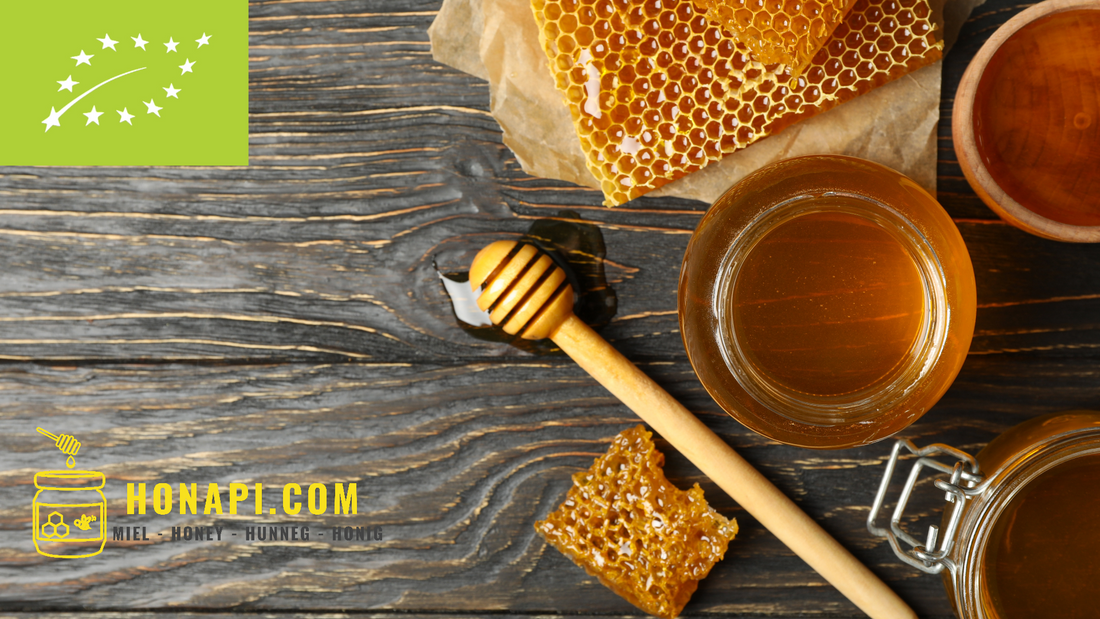
The art of organic beekeeping and our certified organic honey in Luxembourg
Partager
Certified organic beekeeper in Luxembourg


Certified organic honey from Luxembourg
Geoffroy Vigneron, founder of Honapi.com and Honapi Luxembourg, is certified organic beekeeper and can produce organic honey from Luxembourg - BIO Lëtzebuerger Hunneg . Our honey is certified by the certification organization authorized in Luxembourg - Kontrollverein ökologischer Landbau eV (LU-BIO-05). We have the LU-BIO-05 certification and label, Luxembourg organic beekeeping.
Organic beekeeping
Beekeeping is an ancient practice which has taken on a new dimension with the advent of organic farming. In Luxembourg, the picturesque landscape and floral diversity offer ideal conditions for environmentally friendly beekeeping. The Ministry of Agriculture as well as the ASTA organization (Administration des Services Technique de l'Agriculture) support Luxembourg beekeepers in their approach. In this article, we will explore the world of organic beekeeping in Luxembourg and discover the delights of organic honey.
100% organic around 2050 - Luxembourg
The objective is ambitious. Organic agriculture currently accounts for only 6% of all cultivated areas. The new organic action plan will aim for a long-term objective: 100% organic by 2050 - ECO2050 .

Honapi, certified organic honey and beekeeping
Geoffroy Vigneron decided to launch into organic beekeeping from the very beginning. Thanks to a partnership with an organic arborist and market gardener - co-labor - the question did not arise. We immediately began taking steps to develop organic beekeeping and produce certified organic honey.
Chapter 1: The basics of organic beekeeping
Organic beekeeping is an environmentally friendly approach to honey production. It involves not using chemicals that are harmful to bees or the hive, letting bees forage in areas not treated with pesticides, and ensuring healthy living conditions for the bees. In Luxembourg, this practice is increasingly widespread, with beekeepers adopting methods that preserve biodiversity and the health of bees.
Summary for getting started in organic beekeeping:
- Natural wooden hives with natural protection (vegetable/organic paint)
- A wax from organic beekeeping
- A colony of bees from organic beekeeping
- A nourishing product from organic farming (certified organic sugar and syrup)
- A geographical location adapted for biodiversity and the environment (green zone, pesticide-free zone, Natura 2000, etc.)
- Treatments against natural varroa parasites - formic acid and oxalic acid

Chapter 2: The advantages of organic beekeeping
Organic beekeeping has many advantages. First of all, it contributes to the conservation of biodiversity, because bees forage in green areas or cities certified without pesticides, thus helping to preserve the local flora. In addition, it guarantees the production of pure honey uncontaminated by chemical residues, making it a healthy choice for consumers. Finally, it is respectful of the bees themselves, providing a natural, clean and healthy hive environment.

Chapter 3: Production of organic honey in Luxembourg
Luxembourg, despite its small size, is an ideal place for organic honey production due to its variety of flowers, environmental protection and the government's ambition to transition from organic farming to 2050. Local beekeepers ensure that their bees forage in green areas. The flavors and aromas of honey vary depending on the season, reflecting the different flowers at each time of year.

Chapter 4: Where to find our organic Luxembourg honey
We offer organic honey on our online site - honapi.com - or in a specialized partner store.
Many local beekeepers offer organic honey in Luxembourg. You can find their products at local farmers markets, organic grocery stores and even online. Purchasing local organic honey supports beekeepers and promotes sustainable practices.
Organic beekeeping in Luxembourg offers a healthy and environmentally friendly alternative for honey lovers. The beauty of Luxembourg's nature is reflected in the unique flavors of this honey. It is essential to preserve our bees and our environment, and Luxembourg is an inspiring example of how this can be done successfully with support from the government and the ASTA institution, in collaboration with the certification organization.
